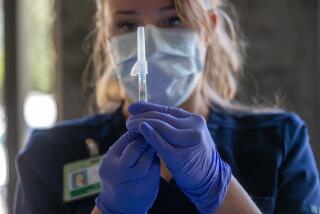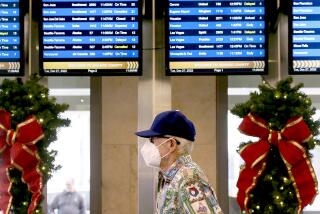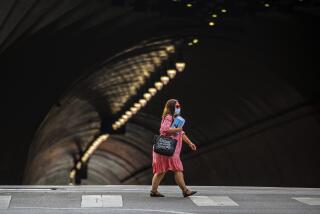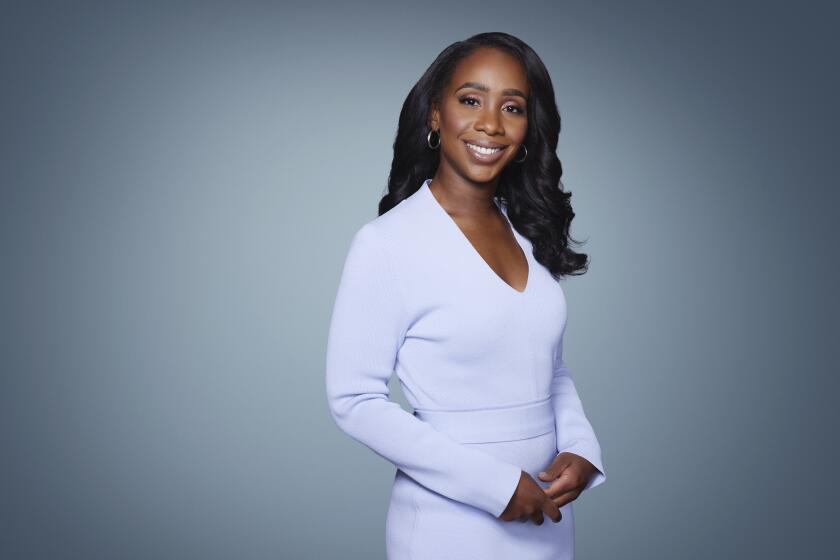Omicron is surging. But for the L.A. Phil and Center Theatre Group, the shows must go on
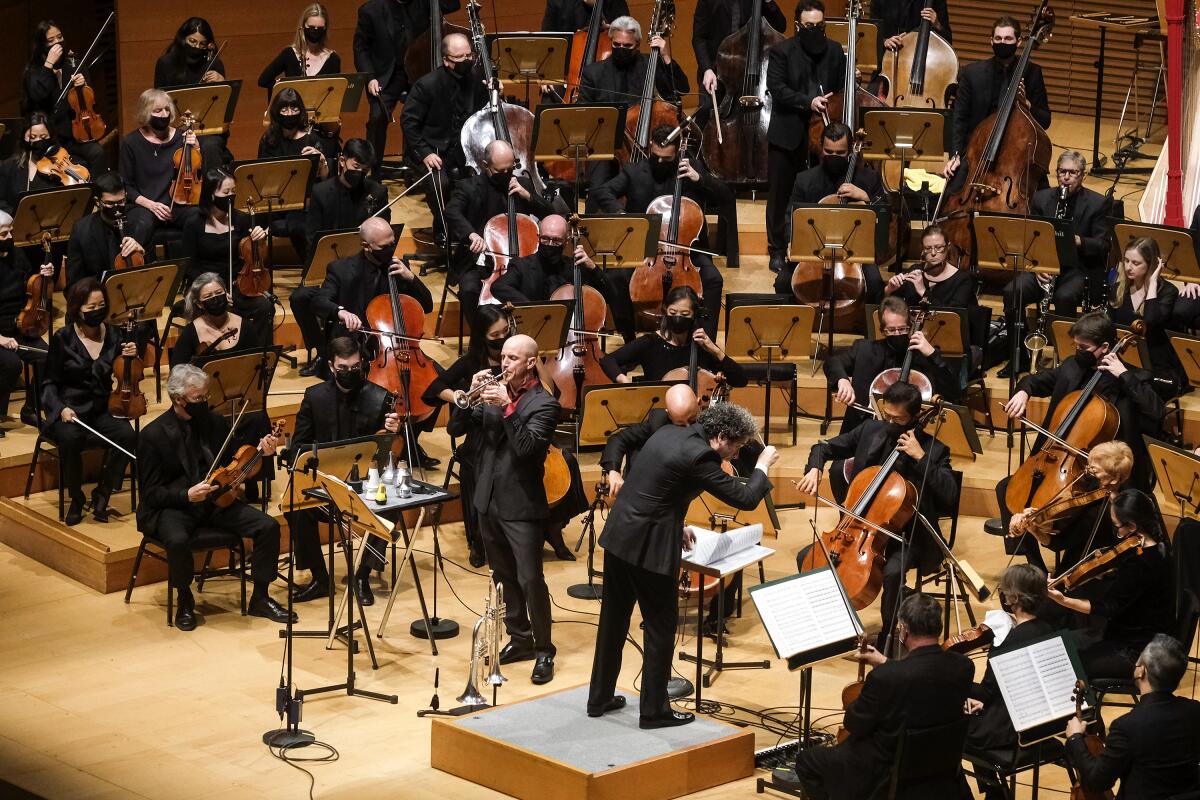
The Grammys have been postponed. The Sundance Film Festival is going virtual. Courthouses are shutting down, and first responders are getting sick in record numbers. But as the Omicron surge worsens in Los Angeles County, many of the region’s largest performing arts organizations, including the Los Angeles Philharmonic and Center Theatre Group, are going ahead with plans to stage concerts and shows in the coming days and weeks.
Although some of the organizations are mandating COVID-19 booster shots, those mandates aren’t due to kick in until later this month or in February — after performances have restarted. Other organizations, including the Hollywood Pantages Theatre (which cancelled “Hamilton” performances through Jan. 26 due to breakthrough infections), the Soraya, East West Players, Pasadena Playhouse, Geffen Playhouse, the Broad Stage and Segerstrom Center for the Arts, have yet to require booster shots, even though medical experts have widely said a booster is crucial to reduce the threat of Omicron. Medical-grade masks are also not yet being mandated by most of these groups, despite widespread published reports that cloth masks do little to stop Omicron transmission.
On Thursday, L.A. County recorded its highest level of infections since the start of the pandemic: 37,215. An estimated 68% of California residents are fully vaccinated, and roughly 35% of fully vaccinated Americans have received their booster shots. Vaccinated and boosted individuals are almost four times less likely to get infected and 38 times less likely to be hospitalized than those who are unvaccinated, according to the L.A. County Department of Public Health.
Performing arts groups’ decidedly unbullish approach to boosters and masks comes as the county averages more than 25,000 cases per day — with a staggering positivity rate of more than 22%. Their stance is in opposition to everything the public has learned about the highly contagious Omicron variant, including the fact that it appears adept at dodging two doses of the vaccine. It also comes during a time when California health officials are doing everything they can to urge workers and residents to upgrade to medical-grade face masks for additional protection.
The Los Angeles Philharmonic — which has a capacity of more than 2,000 in the Walt Disney Concert Hall — is mandating boosters beginning on Jan. 18, but it’s staging eight shows prior to that, including a series of three concerts starting this weekend that feature the famed conductor Michael Tilson Thomas, who is 77 years old and underwent surgery for a brain tumor over the summer. It is also allowing a one-month grace period for patrons to receive their boosters once they become eligible.
Throughout the pandemic, the L.A. Phil has been a proactive leader when it comes to public health. In May 2021, it announced it would reopen the Hollywood Bowl as a majority-vaccinated venue by reserving 85% of the seats for vaccinated guests. A representative for the organization pointed out that, in December, it was among the first cultural organizations nationwide to announce that it would require booster shots. When asked why it would not require them immediately in the face of the current surge, a representative replied, “We have been in constant contact with health officials and the L.A. County Department of Public Health and will continue to amend our policies as needed.”
Center Theatre Group is also requiring booster shots at the beginning of February, but its new show, “Everybody’s Talking About Jamie,” is opening at the Ahmanson Theatre (capacity 2,000) on Jan. 16. In December, CTG canceled its production of “A Christmas Carol” a little more than two weeks into its run, after breakthrough infections were detected in the company.
CTG’s managing director and CEO, Meghan Pressman, said in a statement that CTG is continuing to assess the situation and its protocols to determine what’s best for both artists and audiences.
“It is a fluid situation that has continued to develop, and we are collaborating with the Music Center and L.A. County officials to ensure we are following the best advised health and safety protocols. As we are approaching the beginning of the run of ‘Everybody’s Talking About Jamie’ we are waiting to see how guidance evolves. We are trying to avoid changing too often and creating audience whiplash.”
The Music Center, home to the Dorothy Chandler Pavilion, Ahmanson, Mark Taper Forum and Walt Disney Concert Hall, is requiring boosters beginning Jan. 17 but is also granting a one-month grace period for those eligible for booster shots. A representative for the Music Center said that the organization based its policy on recommendations from the L.A. County Department of Public Health and that once it decided on a date for the booster mandate to take effect, it wanted to allow time for patrons to have the opportunity to obtain an additional shot.
Pressman’s thoughts about whiplash when it comes to COVID-19 protocols are apt during a time when running jokes on social media can best summed up in a recent tweet by late-night host Stephen Colbert, “We’re 2 days from the next CDC guideline: ‘Hey, man. You do you.’”
The Omicron surge comes with peak public pandemic fatigue. The growing consensus that the new variant might be less deadly than previous variants has left many exhausted people to privately wonder if they should just get an infection over with. But even if hospitalizations and deaths are cut in half by Omicron, the shockingly high infection rates almost guarantee that hospitals will be overrun.
Arts organizations have taken a terrible pummeling over the past two years, and there is no doubt that a public hungry for entertainment and the spiritual healing that the arts are uniquely positioned to provide is rooting for a successful return to stages everywhere. But January is shaping up to be a brutal month. Time will tell if shifting policies can keep up with a public health crisis that is moving at lightning speed.
More to Read
The biggest entertainment stories
Get our big stories about Hollywood, film, television, music, arts, culture and more right in your inbox as soon as they publish.
You may occasionally receive promotional content from the Los Angeles Times.
